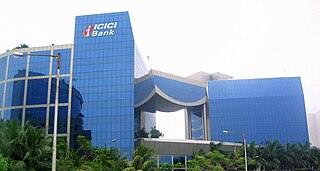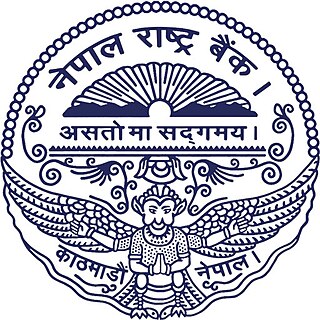
ICICI Bank Limited is an Indian multinational bank and financial services company headquartered in Mumbai with a registered office in Vadodara. It offers a wide range of banking and financial services for corporate and retail customers through various delivery channels and specialized subsidiaries in the areas of investment banking, life, non-life insurance, venture capital and asset management.
Kotak Mahindra Bank Limited is an Indian banking and financial services company headquartered in Mumbai. It offers banking products and financial services for corporate and retail customers in the areas of personal finance, investment banking, life insurance, and wealth management. As of December 2023, the bank has 1,869 branches and 3,239 ATMs, including branches in GIFT City and DIFC (Dubai).

Mobile banking is a service provided by a bank or other financial institution that allows its customers to conduct financial transactions remotely using a mobile device such as a smartphone or tablet. Unlike the related internet banking it uses software, usually called an app, provided by the financial institution for the purpose. Mobile banking is usually available on a 24-hour basis. Some financial institutions have restrictions on which accounts may be accessed through mobile banking, as well as a limit on the amount that can be transacted. Mobile banking is dependent on the availability of an internet or data connection to the mobile device.

Baneshwor is the largest residential area of Kathmandu, Nepal. The area is composed of New-Baneshwor, Mid-Baneshwor, and Old-Baneshwor, Baneshwor Height, Minbhawan, Shankhamul, Bhimsengola and Thapa Gaun.. Major landmarks of Baneshwor include the current meeting place of the Federal Parliament of Nepal, the [[International Convention Centre, Nepal|International Convention Centre]]. Maitighar Mandala is located at the southern border of the neighborhood. Baneshwor is undoubtedly the most developed place in Nepal as it is the central hub of many businesses and opportunities. It is regarded as the land of opportunities by Nepali people. The people in this area are employed in private business or are in the corporate sector.[[International Convention Centre, Nepal|]]
Himalayan Bank Limited (HBL) is one of the largest private banks in Nepal. The Bank was incorporated in 1992 by a few eminent individuals of Nepal in partnership with the Employees Provident Fund and Habib Bank Limited of Pakistan. The bank commenced its operations in January 1993. Himalayan Bank is also the first commercial bank of Nepal with most of its shares held by the private sector of Nepal. The bank has its head and corporate office at Kamaladi, Kathmandu.

AmBank Group comprises AMMB Holdings Berhad is one of the largest banking groups in Malaysia whose core businesses are retail banking, wholesale banking, Islamic banking, and life and general insurance.
A non-banking financial institution (NBFI) or non-bank financial company (NBFC) is a financial institution that is not legally a bank; it does not have a full banking license or is not supervised by a national or international banking regulatory agency. NBFC facilitate bank-related financial services, such as investment, risk pooling, contractual savings, and market brokering. Examples of these include hedge funds, insurance firms, pawn shops, cashier's check issuers, check cashing locations, payday lending, currency exchanges, and microloan organizations. Alan Greenspan has identified the role of NBFIs in strengthening an economy, as they provide "multiple alternatives to transform an economy's savings into capital investment which act as backup facilities should the primary form of intermediation fail."

The Nepal Rastra Bank was established on April 26, 1956 A.D. under the Nepal Rastra Bank Act, 1955, to discharge the central banking responsibilities including guiding the development of the embryonic domestic financial sector. The NRB is functioning under the new Nepal Rastra Bank Act, 2002. The functions of NRB are to formulate required monetary and foreign exchange policies so as to maintain the stability in market prices, to issue currency notes, to regulate and supervise the banking and financial sector, to develop efficient payment and banking systems among others. The NRB is also the economic advisor to the government of Nepal. As the central bank of Nepal, it is the monetary, supervisory and regulatory body of all the commercial banks. development banks, finance companies and micro-finances institutions.

Nepal SBI Bank Limited (NSBL) is the first Indo-Nepal joint venture in the financial sector. Sponsored by three institutional promoters, namely the State Bank of India (SBI), Employees Provident Fund and Agricultural Development Bank of Nepal through a memorandum of understanding signed on 17 July 1992.

NIC ASIA Bank was founded as Nepal Industrial and Commercial Bank on 21 July 1998. It was renamed NIC ASIA Bank on 30 June 2013 after it merged with Bank of Asia. The merger was the first between of two commercial banks in the Nepalese Banking history. After the merger, NIC ASIA was recognized as ”Bank of the Year 2013-Nepal” by The Banker, Financial Times, UK. This is the second time that the bank was recognized with this prestigious award, the previous occasion being in 2007. The Bank has successfully completed its 21 years of operation. The company has currently the following wholly owned subsidiaries: NIC Asia Capital Limited and NIC Asia Laghubittiya Sanstha limited.
NMB Bank Nepal is a commercial bank in Nepal with headquarters in Kathmandu. The bank is licensed by central bank of Nepal, the Nepal Rastra Bank, and has 202 branches across the nation providing retail and commercial banking services.
Civil Bank Limited (CiBL) (Nepali: सिभिल बैंक लिमिटेड; NEPSE: CBL) is a commercial bank in Nepal. Founded in 2010, the bank is an ‘A’ class commercial bank licensed by Nepal Rastra Bank and has branches all across the nation with its head office in Kathmandu which provides entire commercial banking services.
Commercial banks are 'A' Class Financial Institutions in Nepal. Nepal Bank Limited is the first & oldest Commercial bank in Nepal established in 1937 AD with government and private investment.Commercial Bank mainly provide facilities to their customer like Deposits, Loans, Mobile Banking, Remittance.
Siddhartha Bank Limited (SBL) is one of the largest private Commercial Bank in Nepal which is 18th commercial bank to be licensed by Nepal Rastra Bank. It started operation in Dec 2002. and has 196 branches and 226 ATMs all across the nation with its head office in Kathmandu which provides entire commercial banking services and remittance services.
Prime Commercial Bank Limited is a commercial bank in Nepal. The bank is an ‘A’ class commercial bank licensed by Nepal Rastra Bank and has branches all across the nation with its head office in Kathmandu which provides entire commercial banking services.
Laxmi Sunrise Bank Limited is a commercial bank in Nepal. The bank is an 'A' class commercial bank licensed by Nepal Rastra Bank and has branches across the nation with its head office in Kathmandu. The bank's shares are publicly traded on the Nepal Stock Exchange.
Century Commercial Bank Limited was a commercial bank in Nepal. The bank was an ‘A’ class commercial bank licensed by Nepal Rastra Bank and has branches all across the nation with its head office in Kathmandu which provides entire commercial banking services. But now it's merged with Prabhu bank Limited in January 2023.
Global IME Bank Limited is a commercial bank in Nepal. The bank was an ‘A’ class commercial bank licensed by Nepal Rastra Bank and had branches all across the nation with its head office in Kathmandu which provided a complete commercial banking service. The Bank was formed with the merger and acquisition of 21 BFIs including 5 commercial banks i.e. Commerz and Trust Bank, Global Bank, Janata Bank Nepal, Lumbini Bank & Bank of Kathmandu.






